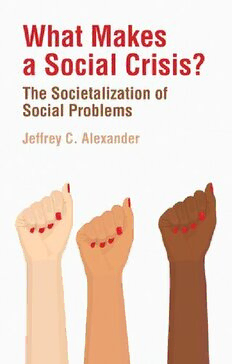Download What Makes a Social Crisis?: The Societalization of Social Problems PDF Free - Full Version
Download What Makes a Social Crisis?: The Societalization of Social Problems by Jeffrey C. Alexander in PDF format completely FREE. No registration required, no payment needed. Get instant access to this valuable resource on PDFdrive.to!
About What Makes a Social Crisis?: The Societalization of Social Problems
In this book, Jeffrey Alexander develops a new sociological theory of social crisis, which he calls societalization. He argues that crises are triggered not by objective social strains but by the discourse and institutions of the civil sphere. In the steady state, reactions to strains unfold within institutional boundaries, handled by organizational elites according to sphere-specific logics. Institutional boundaries can be breached only if there is code switching. When strains become subject to the utopian aspirations of the civil sphere, there emerges widespread anguish about social justice and the future of democratic life. Once admired institutional elites come to be represented as perpetrators, and the civil sphere becomes intrusive legally and organizationally, demanding repairs in the name of civil purification. Resisting such repair, institutional elites foment backlash, and a war of the spheres ensues. Alexander shows how this theory enables us to understand in a new way some of the major social crises of recent years, including the 2008 financial crisis, the Church pedophilia crisis that emerged in 2002, the phone-hacking crisis that exploded in the UK in 2011, and the #MeToo movement against sexual harassment in the workplace, which began with the Harvey Weinstein expose in 2017, and is still on-going today. A major new work by one of the leading social theorists in the world today, this book will be of great interest to students and scholars in sociology, politics and the social sciences generally.
Detailed Information
| Author: | Jeffrey C. Alexander |
|---|---|
| Publication Year: | 2019 |
| ISBN: | 9781509538881 |
| Pages: | 183 |
| Language: | English |
| File Size: | 5.353 |
| Format: | |
| Price: | FREE |
Safe & Secure Download - No registration required
Why Choose PDFdrive for Your Free What Makes a Social Crisis?: The Societalization of Social Problems Download?
- 100% Free: No hidden fees or subscriptions required for one book every day.
- No Registration: Immediate access is available without creating accounts for one book every day.
- Safe and Secure: Clean downloads without malware or viruses
- Multiple Formats: PDF, MOBI, Mpub,... optimized for all devices
- Educational Resource: Supporting knowledge sharing and learning
Frequently Asked Questions
Is it really free to download What Makes a Social Crisis?: The Societalization of Social Problems PDF?
Yes, on https://PDFdrive.to you can download What Makes a Social Crisis?: The Societalization of Social Problems by Jeffrey C. Alexander completely free. We don't require any payment, subscription, or registration to access this PDF file. For 3 books every day.
How can I read What Makes a Social Crisis?: The Societalization of Social Problems on my mobile device?
After downloading What Makes a Social Crisis?: The Societalization of Social Problems PDF, you can open it with any PDF reader app on your phone or tablet. We recommend using Adobe Acrobat Reader, Apple Books, or Google Play Books for the best reading experience.
Is this the full version of What Makes a Social Crisis?: The Societalization of Social Problems?
Yes, this is the complete PDF version of What Makes a Social Crisis?: The Societalization of Social Problems by Jeffrey C. Alexander. You will be able to read the entire content as in the printed version without missing any pages.
Is it legal to download What Makes a Social Crisis?: The Societalization of Social Problems PDF for free?
https://PDFdrive.to provides links to free educational resources available online. We do not store any files on our servers. Please be aware of copyright laws in your country before downloading.
The materials shared are intended for research, educational, and personal use in accordance with fair use principles.

